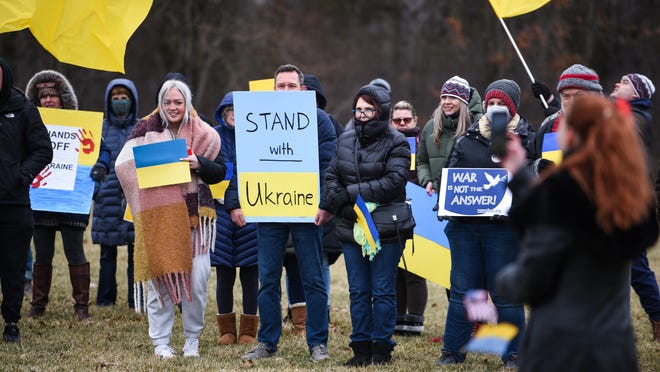
The University of Phoenix has continued to receive more GI Bill funding than any other institution of higher learning, despite its history of government scrutiny for misleading military veterans.
The Veterans Affairs Department sent the for-profit school $1.6 billion in GI Bill funds from 2013 to 2021 for students who enrolled in online and in-person classes. The GI Bill is intended to help veterans get a college education, but it’s also an attractive form of revenue for colleges.
Of the top 10 recipients of GI Bill funding, seven are for-profit colleges while two are private colleges, and just one is a public institution, based on a review of federal data that independent researcher Brett Herda shared exclusively with USA TODAY.
Carrie Wofford, president of the advocacy group Veterans Education Success, is not surprised. For years her group has tracked schools that aggressively enroll veterans, checking to see whether they are delivering quality education.
“These large for-profit college chains have massive recruiting efforts focused on veterans,” Wofford said. “They hire lots of salesmen and hold lots of events on military bases in order to target the GI Bill money which these companies call a ‘gravy train,’ as one whistleblower told the Senate."
The cost of university closures:A college closed, upending one veteran’s life. Two years later, he’s still rebuilding.

A spokeswoman for the University of Phoenix defended its programs and said the institution currently isn’t targeting veterans for recruitment.
“Our focus is on reaching adult students and that will always be the case,” Andrea Smiley said. “It’s an honor that veterans have chosen us to help them advance in their career, and we’re extremely proud of the tens of thousands of veterans who have graduated from one of our accredited degree programs.”
Although the University of Phoenix has consistently been among the top recipients of GI Bill funds, its allotment declined from $391 million during the 2013-14 school year to $73 million in 2020-21. In the 2022 fiscal year, the institution was No. 1, with $69 million, while it ranked 5th for number of GI Bill students served.
In 2015, an investigation by the nonprofit newsroom Reveal found that the University of Phoenix had sidestepped federal bans on recruiting on military bases and used military insignias without approval in its marketing materials The Department of Defense banned the school briefly from receiving tuition assistance funds.
Four years later, the school reached a $191 million settlement with the Federal Trade Commission over allegations that Phoenix had used, “deceptive advertisements that falsely touted” potential jobs at Microsoft and AT&T. The federal watchdog said the company produced ads targeted at veterans.
An unexpected departure?:University of Phoenix president resigns suddenly (and quietly) amid federal inquiry
Citing the FTC action, the Department of Veterans Affairs in 2020 threatened to cut off funding to Phoenix. The VA also warned that Colorado Technical University and American InterContinental University could lose access to the GI Bill. Their parent company, Perdoceo Education Corporation – formerly known as the Education Career Corporation – has been another top recipient of GI Bill funding, according to Herda’s analysis.
Ultimately, the VA backed off, saying the institutions had taken, “adequate corrective actions to avoid suspension.”
Asked about for-profit colleges continuing to be the top recipients of the GI Bill, department spokeswoman Gina Jackson said it was important that, “veterans are protected from 'bad actors' irrespective of whether they are a for-profit, or non-profit institution.”
For-profit colleges are legally approved to receive the GI Bill, she noted, adding that the schools referenced specialize in online learning, allowing them to serve more students.
“This may be a more important determinant than profit status for the amounts of benefits paid,” Jackson said.
Which schools get the most GI Bill funding?
Herda, who worked in derivatives trading for Bank of America and the Royal Bank of Canada, discovered the top recipients as he was developing a consumer tool – the GIBenefit.com – to help veterans choose a college and degree that will pay off financially in the long term. He relied on data that universities report to the Education Department’s Integrated Postsecondary Education Data System.
Of the rankings his data uncovered, Herda said: “A lot of brilliant people running universities have been outfoxed by for-profits when it comes to welcoming the GI Bill. This isn't Kohl's cash and there should be way more competition for veteran enrollment.”
The sole public institution in the top 10, the University of Maryland system, received about $670 million in GI Bill funding, a majority for the University of Maryland’s Global Campus, an online open-access branch of the public school system. That school states it was started to “serve the higher education needs of working adults and servicemembers just like you.”
On Maryland’s tail is Education Management Corporation, a defunct company that ran now-closed schools including Argosy University, Brown-Mackie College and many of the Art Institute campuses.
What does the GI Bill do?
The benefit also comes with a housing allowance for students studying at least half time. The allowance is based on where students live, so a veteran studying in San Francisco, for instance, receives substantially more than one based in rural Texas. It can even pay for veterans to relocate for their studies.

The introduction of the GI Bill in 1944 led to a college enrollment surge and a more educated population. These days it can be used by any veteran or transferred to a family member.
The benefit covers the net tuition and fees at public schools and up to about $26,000 for nonprofit or for-profit colleges. The award is generally good for 36 months – four-years worth of coverage over nine-month academic years – and extensions can be requested.
The federal government requires that for-profit colleges make no more than 90% of their revenue from taxpayer money earmarked for financial aid. That funding includes federal student loans and Pell Grants, typically for low-income families. Until 2023, the 90% restriction did not include GI Bill funding.
Veterans advocates argued that the loophole allowed for-profit colleges to recruit veterans for the other 10% – or more – making the federal government their sole or majority funder. Congress nixed the exception in 2021 as part of the American Rescue Plan.
Why are for-profit colleges popular?
Part of the appeal of for-profit colleges is the flexibility of their classes. They were also among the first schools to offer courses online, an accommodation key for veterans with obligations outside of their academic studies, such as work and family.
Smiley, the University of Phoenix spokeswoman, shared public statements from student veterans who spoke on behalf of the university. They listed as key draws the academic support and online courses they could take anywhere.
"I didn’t have the luxury to attend a typical degree program," wrote veteran Joe Luis Martinez in a comment to the Education Department. He said he went to class in his limited free time when not working at a VA hospital. He earned his degree in 2015 and wrote, " I believe I deserved the opportunity to set myself and my family up for success and the University of Phoenix supported me in this important endeavor."
At the same time, Wofford's group has tracked 450 complaints as of February 2020 from students dissatisfied with their experiences at the university. About 30% of those complaints were tied to a lack of job opportunities.
Regardless, others want a share of the for-profit’s earnings. The University of Arkansas system and the University of Phoenix are in conversations to create a partnership via a nonprofit in Arkansas called Transformative Education Services Inc. The University of Phoenix is owned by owned by private equity firm, Apollo Global Management, and the Vistria Group, a private investment firm.
Nate Hinkel, a University of Arkansas system spokesman, said the entity is separate from the system, but it would enter into a "partnership" with the public university system should it acquire the University of Phoenix.
An affiliation between the two could bring in $20 million for the public university system Hinkel said. Negotiations have been underway for 18 months, but he said the new revenue could bolster student scholarships, faculty and staff salaries and physical maintenance of campuses.
“In an era of stagnant funding for higher education, new resources of this magnitude could be impactful for the UA System moving forward,” Hinkel said.
Hinkel said it was, “premature for us to estimate the purchase price,” but public funds would not be used in the deal.
The affiliation would also allow the University of Phoenix to classify itself as a nonprofit university. Nonprofits receive less federal oversight than their for-profit peers.
Why is it hard to track which colleges receive GI Bill funding?
The data showing which institutions receive the most funding is publicly available but difficult to decipher. The University of Phoenix, for example, has multiple campuses that are tracked independently in the federal government’s system. The now-closed ITT Technical Institute had more than 100 campuses, all listed separately.
For-profit universities, and the companies that run them, often change names and structures, too.
Perdoceo Education Corporation used to be known as Career Education Corporation. Under that name the company ran the Sanford Brown and Le Cordon Bleu schools. The company announced it would shut down those schools in 2015. Buzzfeed reported the for-profit operator cited as a factor in the Cordon Bleu closures the new federal regulations meant to ensure graduates earn enough to repay their student loan debt.
Perdoceo whistleblower:Lies, omissions involved in recruiting students
Another top recipient was DeVry University, which had agreed in 2016 to a $100 million settlement with the FTC over deceptive advertising about how likely their graduates were to find jobs. In connection with that agreement, the Education Department in 2022 canceled the student loans owed by about 1,800 former DeVry students, the first time the department had done so with a school that was still open.

DeVry University was owned by Adtalem Global Education, but was transferred to another company by the end of 2018. DeVry received $57.6 million in GI Bill funds under its new owners, Cogswell Capital, over the next three years. Adtalem’s main property is now Walden University, another large online for-profit college that received $12 million in GI Bill funding in the 2020-21 academic year.
Beyond college accreditation:How to choose a university that will stay open
Michael Itzkowitz is the president of the Higher Education Advisory Group and former Education Department staffer who led development of the College Scorecard, the federal government’s consumer guide to colleges.
He has previously reviewed the colleges receiving the greatest share of GI Bill funding and how much those institutions spend on advertising and instruction for Veterans Education Success.
“The data on GI Bill recipients usually isn’t included in discussion about whether federal funds are flowing to colleges institutions that are serving students well, or extremely poorly,” Itzkowitz said. “The outcomes data on whether student veterans actually succeed after they enroll at an institution are very limited and, oftentimes, non-existent.”
A separate report from the veterans advocacy group identified the University of Phoenix, Education Management Corporation, the University of Maryland, DeVry and Career Education Corporation as the top recipients of GI Bill funding from fiscal year 2009 to 2-2017.
What tools are available to veterans to choose a good school?
- Veterans Affairs’s GI Bill Comparison Tool identifies which schools accept the GI Bill and how much support veterans would receive.
- The Education’s Department’s College Scorecard tracks average graduation rates, student demographics and typical earnings post-graduation. It doesn’t provide veteran-specific information.
- Herda’s tool tracks similar earnings and graduation outcomes but it also breaks out more specific data, such as part-time graduation rates by school. That may be helpful to nontraditional students who may have limited availability to dedicate to their studies.
- Veterans Education Success published a consumer guide of best practices for veterans looking for schools. Wofford, the advocacy group’s president, stressed that prospective students should be aware of promises or job guarantees.
“Be very careful picking a school,” Wofford said. “If you're getting a hard-sell, that school doesn't have your best interest at heart. If they say you have to enroll immediately, that's probably a lie.”
Chris Quintana is a reporter on the USA TODAY investigations team. Contact Chris at [email protected] or via Signal at 202-308-9021.
Source link








